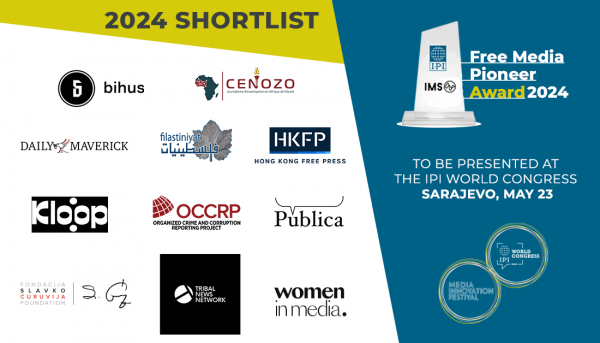The International Press Institute (IPI) today cautiously welcomed the exclusion, in a resolution approved on Friday by an Organisation of American States (OAS) Special General Assembly, of provisions designed to weaken the Special Rapporteurship for Freedom of Expression, the bloc’s free-speech watchdog.
Most significantly, the government of Ecuador – and its allies in Venezuela, Bolivia, and Nicaragua, together the so-called “ALBA” group – failed to win support for language that would have prohibited the Special Rapporteurship from receiving external funding. IPI had viewed this proposal as a concerted attempt to strip the Special Rapporteurship of its independence and effectiveness.
However, the ALBA countries succeeded in inserting a clause in the final document calling for the debate on the structure of the Inter-American Commission on Human Rights (IACHR), which includes the Special Rapporteurship, to continue.
“While we would have preferred to put this issue to rest for good, we are relieved that the immediate threat to the Special Rapporteurship on Freedom of Expression has passed,” IPI Deputy Director Anthony Mills said today. “We are pleased that a majority of OAS member states recognised the importance of preserving the Special Rapporteurship’s autonomy.”
Mills added that Friday’s resolution illustrated the positive impact of civil society on inter-governmental decision-making. IPI led an effort to shine a media spotlight on the issue and lobby regional governments to reject the Ecuadorean proposals, he noted.
“Despite this measure of success, civil society must remain vigilant with regard to future attempts to undermine one of the most effective voices for the right to free expression in the Americas.”
The resolution was intended to be the final chapter of a nearly two-year long process designed to strengthen the IACHR’s work, but the ALBA clause signals that the conversation could be revived again in the months or years to come. Moreover, individual points harbour significant concerns for the Special Rapporteurship’s future.
Point Six of the document “reaffirms [the] commitment to attain full financing of the inter-American human rights system through the Regular Fund of the Organization of American States,” but stipuates that while that commitment is “gradually fulfilled,” the IACHR can continue to accept outside contributions. The Special Rapporteurship currently receives a large portion of its funds from non-member states such as Switzerland, Sweden, and the United Kingdom.
IPI strongly believes that external funding allows the Special Rapporteurship to remain independent from the governments whose actions it monitors.
Point Six adds that these contributions should be “preferably not earmarked.” IPI views this recommendation as problematic, given that many external donors are interested only in specific projects. In addition, non-earmarked funds would be easier to “redistribute” away from the Special Rapporteurship, which was a specific goal of the Ecuadorean proposal.
In general, the document appeared to reject the misleading claim that the Special Rapporteurship’s relatively strong financial position compared to the other seven rapporteurships indicated that freedom of expression was being “prioritised” over other human rights issues.
The Special Rapporteurship is unique in receiving no official OAS funding, relying instead wholly on external donations. The Office’s budgetary situation, therefore, is a reflection only of its ability to fundraise for the initiatives and activities it develops.
Point Seven calls on the IACHR to strengthen all rapporteurships “in keeping with the principle of the indivisibility of human rights.” IPI considers that the strength of the Special Rapporteurship is unrelated to that of the other seven rapporteurships, given the fundamental structural differences.
Ricardo Uceda, executive director of the Press and Society Institute (IPYS), a regional press freedom group, said the resolution was “in practice a defeat for the ALBA countries,” adding, “I believe that that there was a real risk here, but that the danger has passed.”
Lisa Reinsberg, executive director of the International Justice Resource Center, added that while the result was largely positive, “our hope had been that today’s session would definitively put an end to debate on the reform process. Instead, the commission will now be required to invest more time and resources into responding to suggestions, diverting attention away from important human rights concerns.”
Since its creation in 1997, the Special Rapporteurship on Freedom of Expression, currently led by Colombian lawyer Catalina Botero, has used a mix of litigation and advocacy to protect freedom of expression and of the press in the Western Hemisphere.
Its activities have raised the ire of certain governments in the region, including Ecuador. Most prominently, in Feb. 2012, the IACHR, acting on the Special Rapporteur’s recommendation, issued an injunction (known as a “precautionary measure”) calling on the Ecuadorean state to immediately suspend the libel conviction of the owners of the newspaper El Universo.


